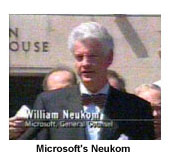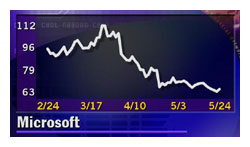|
Judge set to rule on Microsoft
|
 |
May 24, 2000: 7:15 a.m. ET
Jackson ends remedies hearings, mulls three-way split of Microsoft
|
WASHINGTON (CNNfn) - In a surprise move Wednesday, the judge presiding over Microsoft's antitrust trial ordered the Justice Department to submit a revised proposal for breaking up the company by Friday, indicating he may be close to issuing a final ruling in the two-year old antitrust case.
During a hearing at U.S. District Court here, Judge Thomas Penfield Jackson said he would give Microsoft 48 hours to review the revised plan before issuing his order, allowing him to issue a final ruling as early as Tuesday.
|

|
VIDEO
|
|
 CNNfn's Steve Young explains the Microsoft case.
CNNfn's Steve Young explains the Microsoft case.
|
|
Real
|
28K
|
80K
|
|
Windows Media
|
28K
|
80K
|
|
Judge Jackson's sudden end to hearings in the final phase of the landmark antitrust case shocked observers in the courtroom. When one of Microsoft's attorneys started to protest, the judge shot back "this case has been pending two years!"
The software maker had requested an additional six months to prepare its defense against the government's breakup plan.
Many antitrust experts had expected Jackson to hold a series of hearings to investigate the merits of breaking up Microsoft to create a clear record that could sustain an appeal by the software giant.
"I had expected there to be some more hearings," Spencer Waller, a professor at Brooklyn Law School, told CNNfn.com. "I would have expected him to entertain witnesses, but not engage in the full-fledged discovery that Microsoft wanted. That would have given them a little victory, and to the extent where if the court of appeals disagrees with him, it would be on the merits, not the process."
"If Microsoft wants to paint a picture of judge that is biased, this gives them a little more ammunition," Waller added.
During the hearing, Jackson did not explicitly endorse splitting the company, but he asked detailed questions about the form of a potential breakup, indicating that he is seriously considering such a move to prevent Microsoft from violating antitrust laws in the future.
A three-way split?
Jackson asked David Boies, the lead attorney for the federal government, why the Justice Department and a group of 19 states suing Microsoft had proposed to split the company in two, rather than three, parts. Jackson also praised a brief submitted by the Computer and Communications Industry and Software and Information Industry Associations that recommends splitting Microsoft into three companies - one for its Windows operating system, one for its desktop applications, and one for its Internet properties, such as the Internet Explorer Web browser.
 "Microsoft has developed more than a half dozen valuable Internet properties such as MSN, Expedia, HotMail, CarPoint, Microsoft Home Advisor, WebTV and MSNBC," the SIIA said in a press release about its brief. "Those businesses should succeed or fail on their own, and we believe that there is a danger that the new applications company could illegally use the dominant power of Office to stifle competition in these and other important Internet content markets." "Microsoft has developed more than a half dozen valuable Internet properties such as MSN, Expedia, HotMail, CarPoint, Microsoft Home Advisor, WebTV and MSNBC," the SIIA said in a press release about its brief. "Those businesses should succeed or fail on their own, and we believe that there is a danger that the new applications company could illegally use the dominant power of Office to stifle competition in these and other important Internet content markets."
The prospect of a three-way split was the latest twist in the landmark antitrust case. Prior to Wednesday's proceedings, trial watchers had not given strong consideration to that scenario, instead focusing on the possibility that Judge Jackson would either dismiss the government's plan outright, schedule further hearings to discuss the merits of a breakup, or proceed with the government's suggested remedy.
Earlier, Jackson questioned whether the government's plan to split Microsoft into two companies - one for its Windows operating system and the other for its applications business - would foster competition, or just create two powerful monopolies.
"Tell me why they would inspire competition," Judge Jackson asked Boies about the two companies that would be created under the government's proposals.
A difficult question
"Forming two companies versus three was one of the most difficult questions we faced," Boies said.
In defense of their proposal, government lawyers said splitting Microsoft into two pieces would provide an incentive for the newly formed applications company to develop versions of its Office for use with computers running operating systems other than Microsoft's Windows.
The government decided against a three-way split for fear it would have "time consuming, disruptive effects," on Microsoft and the industry as a whole, Boies said. He added that a two-way division "directly met the case that was before the court."
He also argued that a separate applications company might upgrade Microsoft's Internet Explorer Web browser application to become an operating system in itself, creating a middleware threat to the Windows operating system. One of the government's main arguments in its case was that Microsoft tried to thwart the adoption of rival Netscape's browser, fearing it could become a threat to Windows.
After the hearing, Microsoft attorneys expressed disappointment with the judge's abrupt end of the proceedings and vowed to appeal the case when Jackson issues his final ruling.
 "This matter is very near an appellate phase where Microsoft will challenge the procedures used, the findings of fact, the conclusions of law, and any remedy entered," Microsoft general counsel William Neukom told reporters. "We anticipate that we will prevail at the conclusion of the appellate process." [327K WAV or 327K AIFF] "This matter is very near an appellate phase where Microsoft will challenge the procedures used, the findings of fact, the conclusions of law, and any remedy entered," Microsoft general counsel William Neukom told reporters. "We anticipate that we will prevail at the conclusion of the appellate process." [327K WAV or 327K AIFF]
After today's proceeding, Iowa Attorney General Tom Miller praised the way Boies and Wisconsin assistant attorney general Kevin O'Connor have conveyed the 19 states' position in the case.
"Microsoft's alternate remedy proposal wouldn't have the qualities ours has of stopping the illegal activity, prohibiting similar activity in the future, and repairing the damage done to competition," Miller said.
In conclusions of law issued in April, Judge Jackson concluded that Microsoft maintained its monopoly power over PC operating systems by anti-competitive means and attempted to monopolize the Web browser market. He also found that the software giant violated federal antitrust law when it tied its Web browser to its operating system.
In documents filed Monday, Microsoft had asked Jackson to dismiss the government's breakup plan. However, Jackson immediately denied the request at the start of Wednesday's hearing.
"I intend to proceed to the merits of the remedy," he said.
In Wednesday's hearing, Microsoft's lead attorney, John Warden, reiterated the company's argument that the government had failed to show a causal link between Microsoft's conduct and the maintenance of monopoly power than would justify a breakup.
If the court imposes the remedies recommended by government, "that will go a very long way to insure that Microsoft is the one company that will not have a chance to win the next round of competition for the market," he said.
Investors shrug it off
Microsoft (MSFT: Research, Estimates) shares, which have been battered in recent months, added 2-3/8, or 3.8 percent, to 65-9/16 in Nasdaq trade Wednesday. The stock, however, is down more than 45 percent from a 12-month high of 119-15/16 reached in January.
 Though part of that decline may be attributed to the broader slide in the technology sector in recent months, some analysts have advised their clients to stick to the sidelines when it comes to Microsoft, saying that it would be best to wait for a more clear indication of what the final outcome of the case will be. Though part of that decline may be attributed to the broader slide in the technology sector in recent months, some analysts have advised their clients to stick to the sidelines when it comes to Microsoft, saying that it would be best to wait for a more clear indication of what the final outcome of the case will be.
But Andrew Roskill, software analyst at UBS Warburg, told CNNfn on Wednesday that the uncertainly already has been priced into the stock. He also said he expects investors to start moving back into the stock once the appeals process gets under way. [106K WAV or 106K AIFF]
"The stock is trading now at a valuation level that we haven't seen since probably in 1997 and its trading about a half the multiple of its peer group. So I think at this point the lawsuit is pretty much in the stock and it actually represents a good time to get into it. 
|
|
|
|
|
 |

|

